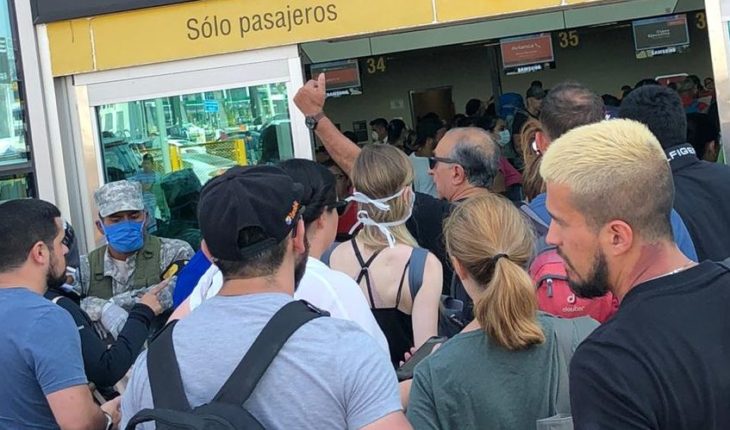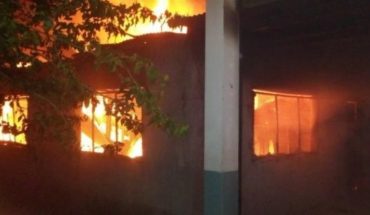Mexicans who were in countries where border closures, such as El Salvador or Peru, are asking for help in returning. They had their flight scheduled but the airline cancelled it and now fear they are forced to go through quarantine away from their families.
The coronavirus pandemic also extends the end of certainties: there is nothing certain beyond the immediate.
At least 300 Mexican citizens are trapped in Lima after The Peruvian President, Martín Vizcarra, decreed a state of emergency.
From Monday at 23:59 no one can enter or leave the country. People like Alejandro Villavicencio saw their airlines cancel flights, tried to buy any ticket that allowed them to leave Peru. After a day of madness, they don’t know what’s going to become of them.
Peru has detected 173 cases of COVID-19. There have been no fatalities so far.
“The Ministry of Foreign Affairs has worked with the Government of the Republic of Peru, to which we recognize its understanding and support, to facilitate the return of Mexicans visiting that sister country. Airlines also participating. Tomorrow details of what has been achieved. They’re not alone. Cheer up,” said the chancellor, Marcelo Ebrard, in a tweet published at 9.27pm on Monday.
Animal Político wanted to gather more data from the secretariat of foreign affairs, but at the close of the note the only information received was the tweet of Ebrard.
Alejandro Villavicencio, 26 and from Mexico City, planned a ten-hour stopover and is now locked in a hotel. He landed Lima, Peru, on Monday at 8 a.m., from Santiago, Chile. What was supposed to be a brief stay to catch his flight back to Mexico has become a hoist that doesn’t know how long it’s going to last.
“We are trapped, without any clear communication and eager to return home,” Alejandro says.
Read: Running out of jobs in Madrid and Paris or losing a stay: the impact of COVID-19 on Mexicans abroad
“I was in the connections part, I had to leave Lima to Mexico City. During this time I was asked to vacate the airport, even with checking done at Interjet,” he says. “Now there is a government order that no one can circulate and we don’t know what’s going to happen,” he laments.
The young man works at the Pearson company, based in Brazil. There he had his convention two weeks ago and took advantage of the trip to walk for a few days. “Everything was going well until the authorities decreed the emergency and the airline canceled the flight,” he complains, in telephone conversation from a lima hotel.
Villavicencio recounts the chaos recorded at the airport during Monday’s day. “National and international wanted to take flights, I was formed from 9 a.m. to 3 p.m., but it was impossible. It was so crowded that they had to evict people who didn’t have a ticket,” he says.
Amid the confusion, Alejandro wanted to buy another ticket. But he got no answer, neither he nor his parents, who were trying to contact the company from Mexico.
The only answer: the flight will be enabled within 15 days, by which the quarantine would be lifted.
On Tuesday afternoon, 45 people attended the Mexican embassy in Lima. “They took our data, made a photocopy and gave us a list of hotels where they were receiving people. That was the whole answer,” he complains.
The minimum price for accommodation is $45, says Mexican.
Your claim: open a special flight for trapped Mexicans. “Some people without resources or without time who were unable to leave and are at the airport, taxi drivers do not want to bring them, it is a dangerous area and they cannot reach Lima, which is 40 minutes away,” he says.
Read: Increases the number of people with COVID-19 in Mexico to 82
“There are children, older adult population, a pregnant person,” he or she warns.
As the streets of Lima fill with military and police, the young man has yet to wait for the government’s efforts. “My situation is complicated, but there are people in worse situations,” he says.
“We call the embassy emergency and he answers us a mailbox.”
Jorque Enrique Portela Velázquez, 41 years old and resident of Aguacalientes, should have taken off on Tuesday at 8 a.m. But he’s stuck in a hotel with his wife and kids.
“We’re scared. We have run out of time to leave the country and no one tells us anything, the airline lines, Aeromexico, were saturated,” he says.
The last flight departed on Monday night. One of its passengers told Animal Político that the aircraft was full and that many of the passengers were crew members of other airlines leaving Peru before the closure of borders and the state of emergency.
“We call the embassy’s emergency line and he only speaks to us by a voicemail,” he says.
In his case, he tried to rent an AirB&B but was refunded the money because the neighbors didn’t want foreigners. Panic about the disease can lead to atavistic reactions, such as xenophobia. The sense of cloistering caused by a state of emergency can detonate suspicion abroad.
Portela complains that no one gives them an answer: neither the Mexican authorities nor the airlines have served them and he fears having to spend the next 15 days in a country that is not his own and without being able to carry out their work.
He also shows concern for compatriots trapped in more remote areas, such as Cuzco, in the Peruvian Andes.
“There are people who are there stranded and go badly by the height. You’re short of air there, and there are people who don’t even have anywhere to stay,” he says.
Like Tom Hanks in San Salvador terminal
Airport chaos didn’t just happen in Peru. In El Salvador, a dozen Mexicans were stranded.
Its president Nayib Bukele decreed the suspension of flights with Mexico after a confusing episode in which he accused the government of Andrés Manuel López Obrador without evidence of allowing access to an Avianca flight bound for San Salvador to twelve patients with COVID-19.
Chancellor Marcelo Ebrard disbeaded this information, but the group of Mexicans is still trapped without being able to return.
Odile Juarez, 33, from Mexico City, is one of the trapped passengers. She recounts that she arrived in San Salvador from Lima, where she was on vacation with 12 other friends.
Eventually, only 4 managed to buy a ticket to leave Peru, while the rest had to stay.
Read: Mexicans in Italy and Spain: this is how COVID-19 quarantine lives
The flight was due to take off at 7:56 p.m. “At 15 o’clock they started closing the shops and saying that he was closed. At 6 p.m. the plane was at the gate. An hour and a half they canceled all flights. No one would come out and nobody would come in. People started to panic. We were locked in an airport,” he explains, in a telephone conversation.
Having a visa, Odile managed a flight to Houston. The rest, he’s still at the airport.
El Salvador has not registered any cases of COVID-19 so far. The government has decreed the closure of the borders and previously quarantined people arriving from the foreign office in detention centres.
“We became Tom Hanks in the film The Terminal, locked up in the airport,” Juarez says.
Like the Mexicans of Peru, they organized a WhatsApp group and tried to communicate with the Mexican authorities.
“None of us have symptoms, there’s a paramedic who’s certified it,” he complained, on Monday night.
The chancellor, Marcelo Ebrard, promised to attend to the group through a tweet, which responded to the public complaints made by Juarez.
“At the embassy you have been very kind. The airline doesn’t say anything, they’re blowing the ball,” he protested.
The suspension of flights between Mexico and El Salvador was decreed on Monday by Salvadoran President Nayib Bukele.
Hours earlier he had accused Mexico of “irresponsible” for allegedly allowing 12 PATIENTS with COVID-19 access to a flight between Mexico City and San Salvador.
Avianca accepted Bukele’s recommendations and evicted the device, albeit without testing the travellers. “That’s something that doesn’t belong to us,” one company source told Animal Político.
Finally, Chancellor Marcelo Ebrard explained that the alleged patients were twelve young Salvadorans living in Chicago and having no symptoms of the disease.
What we do in Animal Político requires professional journalists, teamwork, dialogue with readers and something very important: independence. You can help us keep going. Be part of the team.
Subscribe to Animal Politician, receive benefits and support free journalism.#YoSoyAnimal
translated from Spanish: Mexicans in Peru and El Salvador call for support to return
March 17, 2020 |





